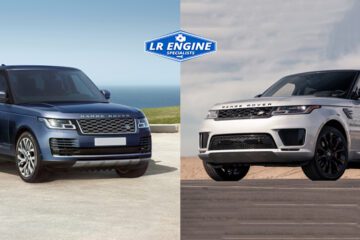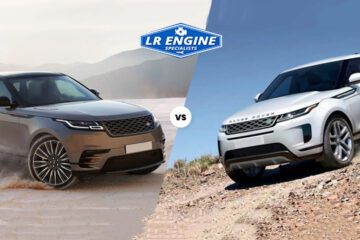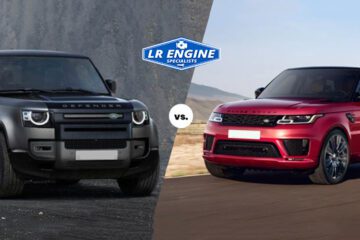For off-road enthusiasts and luxury SUV lovers, opting between the Range Rover D350 Engine vs the Range Rover P530 Engine off-road performance is an essential decision. These two powertrains show the latest diesel and petrol variants available for the legendary Range Rover, each promising a specific blend of power, efficiency, and rugged capability. While the D350 delivers continuous torque and fuel economy ideal for long, rugged journeys, the P530 offers exciting performance and smooth acceleration. When the terrain turns unforgiving, the battle between these two engineering wonders indeed shows what the Range Rover is designed for: uncompromising dominance.
Understanding the Range Rover D350 Engine
The Range Rover D350 Engine is a 3.0-liter inline-six diesel powertrain that generates a commendable 345 horsepower and a robust 700 Nm of torque. Due to their extraordinary torque and efficiency, diesel engines remain a reliable companion for demanding off-road conditions. The D350, equipped with mild-hybrid technology, improves efficiency while delivering steady, low-end torque, an important attribute for handling steep inclines, loose surfaces, and deep mud.
This engine is specifically built for drivers who want consistent torque delivery at lower RPMs. even if you are pulling a trailer or climbing over rocky terrain, the diesel-powered D350 guarantees that the power is always available when required. The high torque output translates to smooth crawling over obstacles without the demand of excessive throttle input, a vital advantage when maneuvering through tricky landscapes.
The Power and Performance of the Range Rover P530 Engine
On the other hand, the Range Rover P530 Engine has a 4.4-liter twin-turbocharged V8 petrol powerhouse that churns out an impressive 530 horsepower and 750 Nm of torque. Unlike the D350, which values efficiency and low-end torque, the P530 is all about high-performance thrills. The extra horsepower provides superior acceleration, making it the choice for drivers who enjoy energetic and exhilarating off-road experiences.
While petrol engines generally lack the low-end grunt of diesel, the P530 compensates with raw power. The twin-turbocharging system ensures instant torque delivery, meaning that despite being a petrol engine, it can still manage the toughest off-road conditions with relative ease. However, its fuel consumption is significantly higher, which may be a concern for those planning prolonged off-road adventures far from refueling stations.
Off-Road Performance: How They Compare
When it comes to Range Rover D350 Engine vs Range Rover P530 Engine off-road performance, various factors determine which engine tackles tough terrain better. These include torque delivery, fuel efficiency, weight distribution, and throttle response.
Torque and Low-Speed Control
With incredible torque at lower RPMs, the D350 diesel engine ensures smooth off-road capability. In off-road driving, steady power delivery is essential and diesel engines shine in providing that slow, consistent push. Even if navigating through deep sand, snow, or rock-strewn paths, the D350’s diesel torque guarantees minimal wheel slip, improving traction and stability.
Conversely, the P530 petrol engine delivers higher peak torque, but it needs higher revs to reach its full potential. More throttle input is vital to extract the same low-end capability found in the D350. While this can be managed using terrain response systems, it needs more driver input and finesse.
Fuel Efficiency and Range
For long off-road excursions, fuel efficiency is a major factor. Diesel engines, including the Range Rover D350 Engine, are essentially more fuel-efficient than their petrol counterparts. This means that in remote areas where fuel stations are sparse, the D350 offers a clear benefit. The combination of better fuel economy and extended driving range makes it the go-to option for adventurers planning prolonged trips into the wilderness.
The P530 petrol engine, while more potent, consumes notably more fuel. This can be a limitation for overlanding and remote off-road driving where access to refueling stations is limited. Unless carrying additional fuel, the P530 may not be as workable for extreme off-road expeditions.
Terrain Adaptability and Control
With Land Rover’s advanced Terrain Response 2 system, both the D350 and P530 automatically adjust to manage everything from rocky trails to sandy dunes with precision. However, the D350’s lower-end torque and superior control at slow speeds make it a better choice for climbing steep inclines and navigating through mud and rock formations. The ability to maintain low-speed precision driving is necessary in technical off-road conditions, an area where the D350 has an edge.
The P530, in comparison, delivers excellent performance in open off-road sections where speed and acceleration are required. It tackles well in desert conditions where fast dune bashing is required, due to its high horsepower and immediate throttle response. However, its higher fuel consumption and need for more throttle modulation make it a little less user-friendly in highly technical off-road environments.
Weight Distribution and Handling
Weight plays an important role in off-road stability. The D350 diesel engine is slightly heavier than the P530, which affects managing dynamics. The extra weight of the diesel engine results in a lower center of gravity, providing better traction and stability on uneven surfaces. This can be advantageous when driving over slippery surfaces such as wet rocks or loose gravel.
The P530 petrol engine, being lighter, offers a more agile driving experience. This can be beneficial in high-speed off-road conditions, where quick steering responses and acceleration are required. However, in extreme rock crawling scenarios, the D350’s stability proves to be a more durable feature.
Which Engine Is Better for Tough Terrain?
The answer depends on the type of off-road driving you plan to do. If your off-road adventures contain technical trails, deep mud, steep inclines, and long-distance expeditions, then the Range Rover D350 Engine is the better option. Its exemplary torque at low RPMs, better fuel efficiency, and steady traction make it perfect for the toughest terrains that require meticulous control.
However, if you prioritize high-speed off-road adventures, dune bashing, or spirited driving on rough terrains, the Range Rover P530 Engine is outstanding with its higher horsepower and immediate throttle response. It offers a thrilling driving experience but requires more meticulous fuel management and throttle control in the toughest off-road conditions.
Conclusion:
Both the Range Rover D350 Engine and Range Rover P530 Engine are designed to deliver exceptional off-road capabilities, but their performance characteristics are designed according to different types of drivers. The D350, with its diesel-powered low-end torque, is ideal for methodical and long-distance off-roading, where efficiency and traction matter the most. Meanwhile, the P530, with its high-powered petrol engine, provides a more exhilarating and aggressive off-road experience, better suited for open and fast-paced terrain.
For those considering a reliable, fuel-efficient, and torque-rich engine for rough terrain, the D350 is an exemplary choice. If raw power and an energetic driving experience are your priorities, then the P530 petrol engine delivers an unparalleled off-road thrill.
No matter which engine you select, both are built to handle the toughest terrains with confidence. If you need specialist advice or support for your Range Rover engine, LR Engine Specialists is your favorite destination for the best solutions in engine performance, repairs, and upgrades. Choose carefully, and let your Range Rover conquer the roads less traveled!
FAQs:
Which engine is better for rock crawling?
The D350 is better for rock crawling due to its balance low-end torque and effortless power delivery at lower RPMs.
Does the P530 perform well in deep mud and snow?
While capable, the P530 needs more throttle input, making the D350’s consistent torque a better choice for deep mud and snow.
Which engine is more fuel-efficient for long off-road trips?
The D350 diesel engine is notably more fuel-efficient, making it exemplary for extended off-road journeys with limited refueling options.
Is the P530 more fun to drive off-road?
Yes, the P530’s high horsepower and instant throttle response provide a more exhilarating off-road driving experience, specifically in open terrain.
Which engine requires less driver input on technical trails?
The D350, with its low-end torque and effortless crawling capability, requires less throttle modulation, making it easier to tackle on tough trails.


